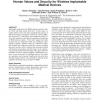Free Online Productivity Tools
i2Speak
i2Symbol
i2OCR
iTex2Img
iWeb2Print
iWeb2Shot
i2Type
iPdf2Split
iPdf2Merge
i2Bopomofo
i2Arabic
i2Style
i2Image
i2PDF
iLatex2Rtf
Sci2ools
CHI
2010
ACM
2010
ACM
Patients, pacemakers, and implantable defibrillators: human values and security for wireless implantable medical devices
Implantable medical devices (IMDs) improve patients' quality of life and help sustain their lives. In this study, we explore patient views and values regarding their devices to inform the design of computer security for wireless IMDs. We interviewed 13 individuals with implanted cardiac devices. Key questions concerned the evaluation of 8 mockups of IMD security systems. Our results suggest that some systems that are technically viable are nonetheless undesirable to patients. Patients called out a number of values that affected their attitudes towards the systems, including perceived security, safety, freedom from unwanted cultural and historical associations, and self-image. In our analysis, we extend the Value Sensitive Design value dams and flows technique in order to suggest multiple, complementary systems; in our discussion, we highlight some of the usability, regulatory, and economic complexities that arise from offering multiple options. We conclude by offering design guid...
CHI 2010 | Human Computer Interaction | Implantable Medical Devices | Security Systems | Value Sensitive Design |
| Added | 02 Sep 2010 |
| Updated | 02 Sep 2010 |
| Type | Conference |
| Year | 2010 |
| Where | CHI |
| Authors | Tamara Denning, Alan Borning, Batya Friedman, Brian T. Gill, Tadayoshi Kohno, William H. Maisel |
Comments (0)

